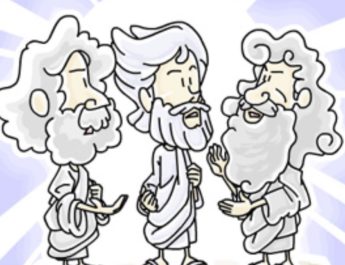1 Kings 3:5-12
Proper 12A
5 At GibeonA the LordB appeared to SolomonC in a dreamD by night;E and GodF said, “AskG what I should give you.”
A “Gibeon” = gibon. From the same as Geba (Geba or Gibeah; hillock); from the same as gabia (cup, bowl, flower; root might mean being convex). This is Gibeon or Gibon, meaning hilly.
B “Lord” = YHVH. From havah (to be, become) or hayah (to come to pass, become, be). This is the name of the God of Israel, the self-existent and eternal one, the tetragrammaton. This pronunciation has been lost to time so “Lord” is generally used in its place.
C “Solomon” = shelomoh. From shalam (to be complete or sound; to have safety mentally, physically, or extending to one’s estate; so, if these things are safe and complete, the implication is that one would be friendly; and, if being friendly, one would make amends and that friendship would be reciprocated). This is Solomon or Shelomoh, meaning “peaceful.” It is the same word as the Hebrew word for peace – shalom.
D “dream” = chalom. From chalam (properly, to bind solidly and so to be plump; to be healthy or strong, to recover; figuratively, to dream). This is a dream or dreamer.
E “night” = layil. Properly, this refers to light twisting away. It is used for night or midnight. Figuratively, this can mean adversity.
F “God” = Elohim.
G “ask” = shaal. This is to ask, inquire, beg, borrow, desire, request. It can also mean to demand.
6 And Solomon said, “You have shown greatH and steadfast loveI to your servantJ my father David,K
H “great” = gadol. From gadal (to grow up, become great, become wealthy – to advance. The root meaning may be to twist in the sense of the process of growing). This is great, high, bigger, noble, old, marvelous. It can also refer to someone who is powerful or distinguished.
I “steadfast love” = chesed. From chasad (being good, kind, merciful; may mean bowing one’s neck as is done in the presence of an equal for courtesy’s sake; so, if one in a superior position is treating you like an equal, that is what is captured here). This is favor, goodness, kindness, loving kindness, pity, reproach, or a good deed. When done by God to humanity, this is mercy/loving kindness. When done by humanity to God, it is piety.
J “servant” = ebed. From abad (to work, serve, compel; any kind of work; used causatively, can mean to enslave or keep in bondage). This is a servant, slave, or bondservant.
K “David” = david. From the same as dod (beloved, love, uncle); the root may mean to boil, which is used figuratively to describe love. So, this implies someone you love such as a friend, a lover, or a close family member like an uncle. David’s name likely means something like “beloved one.”
because he walkedL beforeM you in faithfulness,N in righteousness,O and in uprightnessP of heartQ toward you;
L “walked” = halak. This is go, come, walk. It is walk literally and figuratively and includes people and animals. It can be used figuratively for one’s moral life – how we walk according to God’s way or against it. It can also refer to the walk of life as in the course one’s life takes, the choices we make, etc.
M “before” = paneh. Literally “before your face.”
N “faithfulness” = emet. From aman (to believe, endure, fulfill, confirm, support, be faithful, put one’s trust in, be steadfast. Figuratively, this is to be firm, steadfast, or faithful, trusting, believing, being permanent, morally solid). This is firmness or stability. Figuratively, it is faithfulness, truth, or trustworthiness. This is the same root that “amen” comes from.
O “righteousness” = tsedeqah. From the same as tsedeq (rightness, righteousness, vindication. It is everything that is just or ethical. That which is right in a natural, moral, or legal sense. It also includes just weights (i.e. true weights). Figuratively, this is justice, righteousness, equity – even prosperity). This is righteousness, justice, righteous acts, and moral virtue.
P “uprightness” = yesharah. 1x in OT. From yashar (straight, right, level; pleasing, whether pleasing God or pleasing other people. So, it is upright or righteous); from yashar (to be straight, right, even, smooth, or agreeable; figuratively, to make something pleasant or prosperous). This is uprightness or rectitude.
Q “heart” = lebab. May be related to labab (to encourage; properly, to be encased as with fat; used in a good sense, this means to transport someone with love; used in a bad sense, it can mean to dull one’s senses). This is the heart, courage, one’s inner self, the mind, or the will. Heart is only used in a figurative sense in the Old and New Testaments.
and you have keptR for him this great and steadfast love, and have given him a son to sitS on his throneT today.
R “kept” = shamar. This is to keep, watch, or preserve. It means to guard something or to protect it as a thorny hedge protects something.
S “sit” = yashab. This is to sit and so to remain and so to dwell. It is sitting for any reason – as a judge, in order to ambush, or just sitting quietly. Causatively, this can mean settling or marrying. This can also mean continue, endure, or establish.
T “throne” = kisse. From the same as kese (full moon); perhaps from kasah (to cover, conceal, overwhelm; to cover as clothes do or to hide a secret). This is throne – a seat that is covered or has a canopy. Thus, it is a seat that conveys authority.
7 And now, O Lord my God, you have made your servant king in place of my father David, although I am only a littleU child;V I do not knowW how to go out or come in.
U “little” = qaton. From qut (to cut off, be grieved; figuratively to detest). This is small, young, least, not important. It could be a small quantity, size, age, or importance.
V “child” = naar. May be from na’ar (to shake, toss up and down, tumble around). This is a child or a servant. It is a child in their active years so they could be aged anywhere from infancy to adolescence.
W “know” = yada. This is to know, acknowledge, advise, answer, be aware, be acquainted with. Properly, this is to figure something out by seeing. It includes ideas of observation, recognition, and care about something. It can be used causatively for instruction, designation, and punishment.
8 And your servant is in the midst of the peopleX whom you have chosen, a greatY people, so numerousZ they cannot be numberedAA or counted.BB
X “people” = am. From amam (to darken, hide, associate; creating shadows by huddling together). This is people or nation. It can be used specifically for a tribe, collectively of troops or armies, or figuratively to refer to a flock of animals.
Y “great” = rab. From rabab (increasing in any aspect whether quantity, authority, size, quality, greatness, etc.). This is abundance, many, elder, exceedingly, great. It refers to abundance of amount, rank, or status.
Z “so numerous” = rob. Related to “great” in v8. From rabab (see note Y above). This is any kind of abundance.
AA “numbered” = manah. To weigh out, reckon, count, number, set, tell. By implication, it is allotting or providing something officially.
BB “counted” = saphar. From sepher (writing, document, book, evidence). This is properly to tally or record something. It can be enumerate, recount, number, celebrate, or declare.
9 Give your servant therefore an understanding mindCC to governDD your people, able to discernEE between goodFF and evil;GG for who canHH govern this your greatII people?”
CC “understanding mind” = leb + shama. Literally “listening heart.” Leb may be related to labab (to encourage; properly, to be encased as with fat; used in a good sense, this means to transport someone with love; used in a bad sense, it can mean to dull one’s senses). This is the heart, courage, one’s inner self, the mind, or the will. Heart is only used in a figurative sense in the Old and New Testaments. Shama is to hear, call, consent, or consider. It implies listening intelligently, giving attention, and, because of these two factors, obedience and action are often implied.
DD “govern” = shaphat. This is to judge, defend, pronounce judgment, condemn, or govern. It can refer to God judging or to human judges. This is pronouncing a verdict in favor or against so it implies consequences or punishment. It can also mean to litigate or govern as one with authority.
EE “discern” = bin. This is to discern, consider, attend to. It refers to distinguishing things in one’s mind or, more generally, to understand.
FF “good” = tob. From tob (to be pleasing, to be good). This is good, beautiful, pleasant, agreeable, bountiful, at ease. This word is used for goodness as a concept, a good thing, a good person. This can refer to prosperity and welfare as well as joy, kindness, sweetness, and graciousness. So, this is ethically good, but also enjoyably good.
GG “evil” = ra. From ra’a’ (to be evil, bad, afflict; properly, to spoil – to destroy by breaking into pieces; figuratively, to cause something to be worthless; this is bad in a physical, social, or moral sense; that which displeases, to do harm or mischief, to punish or vex). This is bad, disagreeable, that which causes pain, misery, something having little or no value, something that is ethically bad, wicked, injury, calamity. This refers to anything that is not what it ought to be – a natural disaster, a disfigurement, an injury, a sin.
HH “can” = yakol. This is to be able, endure, overcome, prevail.
II “great” = kabed. From kabad (to be heavy, weighty, burdensome). This is heavy, grievous, sore. It can also be weighty in the sense of gravitas. The word for “glory” in Hebrew comes from this root (kabod).
10 It pleasedJJ the LordKK that Solomon had asked this.LL
JJ “pleased” = yatab. This is to be good or pleasing, joyful. It can also mean doing good in an ethical sense or be beautiful, happy, successful, or right.
KK “Lord” = Adonai. From adon (lord, master, owner); root means to rule or be sovereign. This is the actual Hebrew word for Lord used (in a different form) of humans and (in the present form) of God. It means someone who is in control.
LL Literally “the thing was pleasing in the sigh of the Lord that Solomon had asked this thing.” Dabar is from dabar (to speak, declare, discuss). This is speech, a word, a matter, an affair, charge, command, message, promise, purpose, report, request. It is a word, which implies things that are spoken of in a wide sense.
11 God said to him, “Because you have asked this, and have not asked for yourself long lifeMM or riches,NN or for the lifeOO of your enemies, but have asked for yourself understanding to discernPP what is right,QQ
MM “long life” = yom + rab. Literally “many days.”
NN “riches” = osher. From ashar (to gain wealth, become rich, enrich; to accumulate). This is fortune or wealth.
OO “life” = nephesh. Related to naphash (to refresh or be refreshed). This is soul, self, person, emotion. It is a breathing creature. Can also refer to appetites and desires.
PP “discern” = shama. Same as “understanding” in v9. See note CC above.
QQ “what is right” = mishpat. Related to “govern” in v9. From shaphat (see note DD above). This is a verdict or formal sentence whether from humans or from God. It includes the act of judging as well as the place that judging takes place, the suit itself, and the penalty. Abstractly, this is justice, which includes the rights of the participants.
12 RR I now do according to your word.SS IndeedTT I give you a wiseUU and discerning mind;VV no one like you has been beforeWW you and no one like you shall ariseXX after you.
RR {untranslated} = hinneh. From hen (lo! Behold! If, though; an expression of surprise). This is to draw attention, show suddenness or surprise, or to emphasize the importance of the coming statement. See! Lo! Behold!
SS “word” = dabar. Same as {untranslated} in v10. See note LL above.
TT “indeed” = hinneh. Same as {untranslated} in v12. See note RR above.
UU “wise” = chakam. From chakam (to be wise or teach wisdom; this is wisdom in thought, word, or action). This is wise, skillful, cunning, or artful.
VV “mind” = leb. Literally “heart.” Related to “heart” in v9. See note Q above.
WW “before” = paneh. Literally “before your face.”
XX “arise” = qum. To arise, stand, accomplish, establish, abide. This is rising as in rising against, getting up after being sick or asleep, arising from one state to another, becoming powerful, or rising for action. It can also be standing in a figurative sense.
Image credit: “Wisdom” by Ayibiowu Olusola David, 2008.




